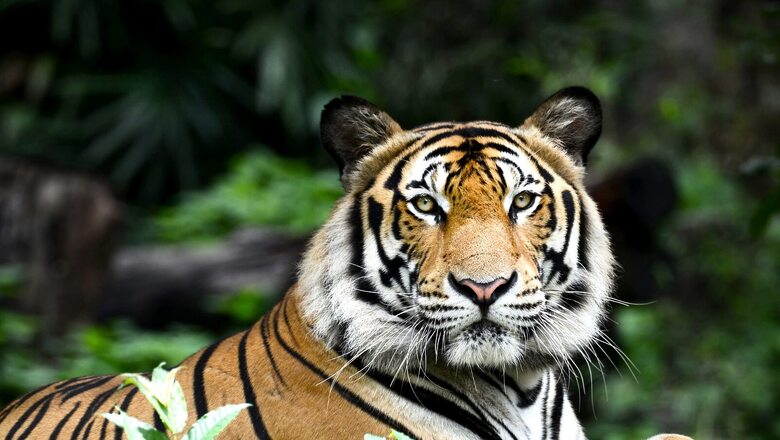
views
The latest Tiger Census confirmed that the current tiger population in India has increased to 2967 in 2021 from 2226 in 2014. The Indian tiger survey released last year revealed that India now accounts for about 70 percent of the world’s tiger population.
As we celebrate “International Tiger Day”, on July 29 it’s important to raise awareness for tiger conservation, a corporate professional and wildlife photographer by passion, Varun Khullar asserts. He believes that this mammoth task can only be achieved by collective efforts and the “Save the Tiger” campaign must inspire and spread awareness.
What motivated you to be a part of the “Save the Tiger” campaign?
The combination of grace, strength, agility, and enormous power has earned the tiger its pride of place as the National Animal of India. The “Save the Tiger” campaign started in 2010 and its conservation automatically ensures the conservation of a large number of flora and fauna and entire ecosystems. Royal Bengal Tiger is the pride of our nation and its decreasing population in the past years due to human-animal conflicts and poaching motivated me to be a part of the “Save the Tiger” campaign. We must do whatever we can within our power to ensure their survival and make sure our future generations can also enjoy their beauty and presence.
How do you plan to contribute to the campaign?
“Save the Tiger” campaign is to build awareness among the masses about saving our National Animal. As apex predators, Tigers keep prey species under control. This protects the vegetation which in turn maintains the integrity of streams, forests and croplands that provide people around the world with clean air, water, food and financial benefits. When we protect tigers, we protect ourselves. For the last four years, I have been printing my Wildlife Tiger calendars and distributing them to my friends and family circle to create awareness of the beautiful nature and Tigers we have around us. Through this medium, I try to increase wildlife tourism among masses which generates funds for Forest departments and the funds are then used appropriately for saving the Tiger and saving the forests from poachers. This money is used for setting Camera traps, securing boundaries, generating water supply and electricity in forest core areas, setting up security check posts deep in forests to help the “Save the Tiger” campaign.
Since when have you been into wildlife photography and what about tigers attracts you the most?
I had started this journey by being a normal visitor to a wildlife sanctuary and experienced a safari ride into the jungle, just like anyone else would do, all this happened a good 12 years back. The love for wildlife has ever since beckoned me back into its arms. After every safari, there are always new stories to share and wonderful experiences to take back. It is an incredible experience watching tigers in their natural habitat roaming freely without any inhibitions. The thrill and excitement during the search, the chase, the patience and then the reward of seeing some beautiful tigers is what truly makes a safari unforgettable.
Tigers have more than 100 stripes on their body but no two tigers have the same pattern of stripes. Everything about the tiger attracts me, their behaviour, the roar, their walk, the look into their eyes, the thrill of the tiger chasing the prey and the cuddle of the tigress with its cubs. In photographing the tiger — patience is the key.
Can you share a life-changing experience that you’ve had while capturing the wild cats?
The Tiger sighting of the majestic T24 named Ustad in 2010 will always remain in my heart. One of the most beautiful male tigers of the Ranthambore Tiger Reserve, Rajasthan, T24 was eye-candy and a delight for wildlife enthusiasts and wildlife photographers who visited Ranthambore just to have a glimpse of him. He was shifted to Sajjangarh Zoo in Udaipur in May 2015 after being accused of killing four people. The tag of ‘MANEATER’ for Ustad was indigestible and the killings attributed to Ustad, were mere accidents as I feel he never ventured out of his territory but people went to his home. This animal and human conflict are heartbreaking and for us as humans, it’s high time now to realize the importance of maintaining a perfect balance in the ecosystem.
How do you balance being a corporate professional and a wildlife photographer?
With interest in wildlife and especially Big Cats my passion persuaded me to buy a good DSLR camera with a telephoto lens and I started capturing the wildlife in my cameras. Initially, before Covid-19 I somehow managed to take out time from corporate life once in 2-3 months for wildlife getaways like Ranthambore national park, Jim Corbett national park and Jaipur and captured the beautiful big cats — tigers and leopards.
Capturing tigers often was difficult as with a busy corporate life one cannot travel often to wildlife parks but passion keeps one going. I started capturing birds and started building an interest in bird photography. With capturing birds in and around Gurugram — Delhi NCR I have built a strong interest in Birds of the Indian subcontinent. People have started calling me a ‘Nature & Tiger Lover’. At weekends I try to visit nature parks around my place and try to capture nature with my camera. My seniors understand my passion and have supported me in the same.
Read all the Latest News, Breaking News and Coronavirus News here.


















Comments
0 comment